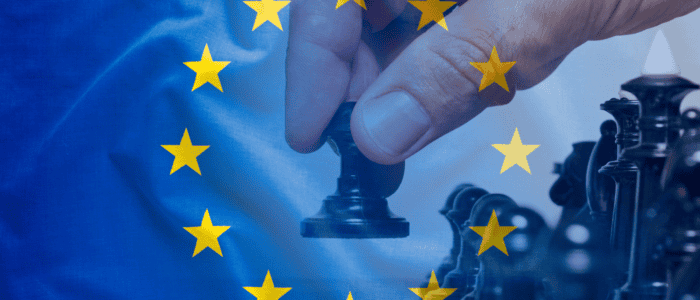Published
Action and Reaction in International Trade
Subjects: European Union North-America

This blog post is based on an article published in El País on the 24th of November 2024 with Isabel Pérez del Puerto. The original article can be found here.
Following Donald Trump’s victory in November’s elections, a climate of uncertainty has emerged. International trade is one of the areas where the upcoming occupant of the White House has placed his focus, and it seems evident that his arrival will reset the rules of the game. Paradoxically, to strengthen its position, Europe should heed the advice of US most patriotic superhero, Captain America: “Courage is not the absence of fear, but the willingness to face it.”
The EU must respond by energising its economy to reduce its vulnerabilities and enhance its resilience to external changes. Three fundamental concepts are key to this effort: deregulation, investment, and productivity. These are particularly crucial for strengthening the ability of European businesses to develop and leverage digital technologies.
The digital sector is one of the largest investors in research and development and a major driver of services that boost productivity. If European businesses fail to integrate digital innovations into their goods and services, they risk losing competitiveness and weakening their position relative to Asian and US firms. The European car industry, and its delays in electric vehicles and connectivity, is a clear example.
The economic impact of regulations is particularly harmful to the digital economy. It is necessary to assess the negative economic effects on companies arising from the implementation of rules such as the General Data Protection Regulation (GDPR), the Digital Markets Act, the Digital Services Act, or the Artificial Intelligence Act. These regulations restrict European companies’ ability to use and combine one of today’s most crucial productive resources: data. A full explanation of how this process has unfolded and how it relates to Europe’s lagging productivity and economic specialisation can be found here.
Regarding investment, it is unlikely that European governments will embrace higher levels of common debt, especially as funds from NextGeneration EU, the first experiment in European debt, are still being disbursed. Therefore, the EU should employ supply-side policies to enhance Europe’s productive capacity through structural reforms, investment in human capital, and support for research and development. It should also prioritise greater flexibility in markets for goods, services, labour, and capital. While many of these policies must be implemented at the member state level, the European Commission can and should contribute to these reforms through regulatory simplification.
Regardless of who is in power, the US is not Europe’s economic adversary but rather its largest ally. In 2022 alone, European exports of goods and services to the other side of the Atlantic exceeded €800 billion, representing 5 percent of the EU’s GDP. At the same time, during his campaign, Donald Trump proposed general tariffs on imported goods ranging between 10 and 20 percent that have the power to really hurt European businesses.
However, rather than being deterred by potential tariffs, Europe must focus on what it can change, not on what it cannot. Implementing reforms to strengthen innovation, competitiveness, and investment in European countries is more essential than ever. The EU must also play its part by addressing regulatory distortions in the digital economy, enabling businesses to develop and access the latest digital technologies. Through these efforts, the EU economy can not only withstand external pressures but also seize new market opportunities.